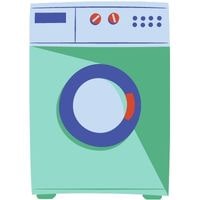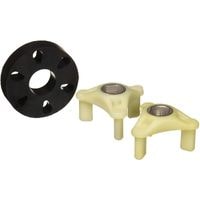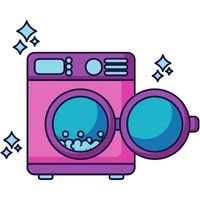Washing Machine Making Loud Noise. There are many different reasons for a noisy washing machine, the most common being when you start the spin cycle and hear loud banging or clanging sounds coming from within that loud enough to be heard throughout the home.
This is mostly caused due to loose parts banging around once they are no longer secure after joints or pins become unfastened.
If you’re handy with a wrench and/or screwdriver, then you may be able to quiet your noisy washing machine without the help of expensive professionals.
Washing Machine Making Loud Noise
Washing Machine Making Loud Noise. In some instances, the drum bearings need to be replaced. If your washing machine makes a loud rumbling or repetitive banging sound, which is particularly bad on a spin cycle, then it is most likely due to loose or worn out drum bearings.
Noises During Spin Cycle
Unbalanced loads may cause loud noises in the spin cycle. If this is the case, turn off the washer and make sure the tub is evenly stacked with clothes. Close the lid and turn it back on.
If this doesn’t work, unload some clothes in order to find out if they were really causing a problem or not. Unloading clothes will give you a better idea of what exactly was making that sound you heard last.
If it was indeed a problem with your clothes, you can fix that problem immediately and move on to other things. If however there’s no improvement after taking some time off a while back.
Then something else might be going wrong with your machine – it could be a problem with the drive pulley, clutch belt, motor coupling, shock absorbers or drain pump (inside of your drum).
Motor Coupling Issue
A broken coupling joining the washing machine motor to the transmission can prove frustrating if left to go.
But a little know-how and determination might be enough to fix it. You’re in luck since this article is made for you.
Take a look at all we have and prepare to tackle your problem head-on. The first step would be determining what you need, after that, locating where your nearest replacement can be found.
Make sure no cracking or breaking occurs upon completion of installation, so please be very careful – it pays off with longer-lasting appliances.
Failure Of Shock Absorbers
Shock Absorbers rotate the washing tub so that clothes are spun not just around but also in a circular motion. A lack of decent shock absorbers leads to a lot of noise when the Washing Machine agitates or spins at full throttle.
Problems with the shock absorbers can result in many varied negative side effects and need to be taken care of as soon as possible to prevent further degradation of the machine´s performance and overall quality.
Clutch Error
The clutch within the washing machine is a pressure plate that controls the spin speed of the machine through the connection with either a direct drive system or a belt to turn the drum.
It is one of several drive systems that, in other machines, work as simply either off (no spin) or on (full spin). For machines like these, which are primarily driven by water, an out-of-balance washer can result in the drum being spun at speeds higher than normal.
However, it is not uncommon for clutch failures to make a loud sound when this happens, and usually, this is due to either wear or debris build-up.
Noises Of Whining
A high-pitched whining or squealing sound when the laundry is running can be a result of worn motor bearings (this occurs over time if the bearings are not replaced).
A quick and easy way to check it out without resulting in having to purchase a new washer is to remove the belt from the drive pulley, turn to a spin cycle, switch on the power and listen for the noise.
If you hear what sounds like nails scratching on a chalkboard, you have bad motor bearings. If you don’t hear anything, take off the back panel of your washer and make sure that there aren’t any metal or hard objects stuck between your drum and tub.
Some items can even fall through holes in your tub into smallholders inside, where they lodge as they enter the outer drum area causing friction/scratching noise.
Noisy Crackling
If you hear a crackling or grating noise during agitation or spin cycles, this may be caused by worn brushes in the motor that are arcing with the commutator.
This can damage the motor, so we recommend contacting a technician to conduct an inspection of your washer’s pump. Cracking and grinding noises could also indicate dirt.
If the noise occurs only during the final cycles of each laundry load, for example, when draining water, it may be because there is debris caught in your pump, and so we therefore, recommend having a technician take a look at it as soon as possible.
Noises Of Scraping
There can be many causes of scraping noise. That’s why it’s important to first remove any loose items in the washing machine, like buttons and shirt pockets.
If this doesn’t solve the problem, you need to check if something is trapped between the floor and the washtub. To do so, you can use a flashlight to look into the drum.
If there is nothing stuck inside, then it could help to check for loose or broken parts like a worn-out direct drive coupling.
Final Thoughts
Maintaining your washing machine will help prolong its life, reduce repairs, and minimize noise. A noisy washer is telling you something isn’t working correctly, and the sooner the problem comes to your attention, the better it is for your appliance.
Identifying in which cycle the noise occurs will assist in determining the cause, If a part is failing or if more than one part is causing problems.
Hopefully, we’ve provided you with enough information on how to identify various noises that your washing machine can make and what can cause them.
Otherwise, if you’re not mechanically inclined or don’t have time you may want to consider calling a service specialist.
Washing Machine Making Loud Noise
Related Guides
